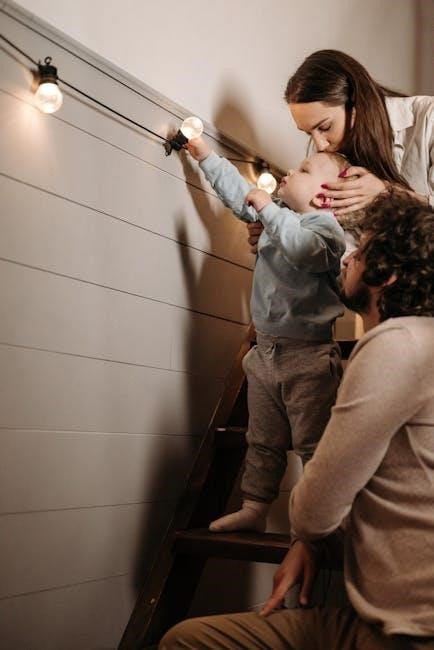This guide provides insights into the content of Love Flops, helping parents make informed decisions about their children’s media consumption․
1․1 Overview of the Guide’s Purpose
This guide aims to assist parents in understanding the content of Love Flops and its suitability for their children․ It provides detailed insights into the show’s themes, language, and potential sensitive topics, helping parents make informed decisions․ The guide also offers practical advice on how to discuss the series with children, fostering open conversations and critical thinking․ By addressing key aspects such as age-appropriateness and emotional impacts, the guide serves as a valuable resource for parents seeking to navigate their children’s media consumption responsibly․ Its purpose is to empower parents with the knowledge needed to support their children’s viewing experiences effectively․
1․2 Importance of Parental Involvement in Media Consumption
Active parental involvement in media consumption is crucial for guiding children through complex content like Love Flops․ By engaging with the material, parents can help children interpret themes, understand context, and develop critical thinking skills․ This involvement fosters open dialogue, allowing parents to address sensitive topics and ensure their children grasp the intended messages․ It also enables parents to set boundaries, reinforcing values and ensuring the content aligns with their child’s maturity level․ Such engagement not only protects children from inappropriate content but also enriches their viewing experience, turning it into a learning opportunity․ Regular discussions about media help build trust and strengthen parent-child relationships, making it a vital part of modern parenting․
Content Overview of “Love Flops”
Love Flops blends comedy, romance, and ecchi elements, following a male lead in a harem setup․ It starts as a standard romcom but gradually deepens into a more complex narrative․
2․1 Genre and Target Audience
Love Flops falls under the genres of comedy, romance, and ecchi, appealing primarily to young adults and teenagers․ The series combines lighthearted humor with romantic elements, making it popular among fans of harem and romantic comedy anime․ Its ecchi aspects, which include suggestive content, are typical of the genre and may attract viewers who enjoy such themes․ The target audience is likely older teenagers and young adults due to its mature undertones and comedic style․ Parents should be aware of these elements when considering suitability for younger viewers․ The show’s blend of genres makes it a staple in the anime community, particularly for those who enjoy dynamic character interactions and evolving relationships․
2․2 Brief Synopsis of the Show
Love Flops follows the story of a young male protagonist navigating a complex web of romantic relationships and comedic misadventures․ The series begins with a chance encounter that sets off a chain of events involving multiple female characters, each with distinct personalities and motivations․ As the protagonist interacts with these characters, the show explores themes of love, friendship, and self-discovery, often with a lighthearted and humorous tone․ The plot is driven by character-driven storylines and situational comedy, with a mix of heartfelt moments and ecchi elements․ Parents should be aware that while the show is primarily comedic, it includes some mature themes and suggestive content that may require discussion․
2;3 Themes and Messages in the Series
Love Flops explores themes of love, relationships, and personal growth, blending humor with deeper emotional moments․ The series highlights the complexities of romantic interactions, showcasing both the joy and challenges of connecting with others․ It also touches on self-discovery, as characters navigate their identities and aspirations․ While the show primarily focuses on comedic and lighthearted scenarios, it occasionally delves into heartfelt moments that emphasize the importance of empathy and understanding․ Parents should be aware that some themes may spark conversations about boundaries, consent, and unhealthy relationship dynamics, making it a valuable opportunity to guide discussions about healthy relationships and emotional intelligence․ The series strikes a balance between entertainment and meaningful storytelling, offering plenty to reflect on for both teens and adults․

Content Suitability Analysis
Love Flops contains moderate sexual content and mild profanity, with some suggestive humor․ Parents should review the material to ensure it aligns with their child’s sensitivity and values․
3․1 Sex and Nudity in the Show
Love Flops contains moderate sexual content, including suggestive humor and brief imagery․ While there is no explicit nudity, some scenes may be inappropriate for younger audiences․ The show’s ecchi elements are typical for its genre, with mild fan-service moments․ These scenes are not overly graphic but could still raise concerns for parents․ The content is geared toward young adults and older teens, as it reflects common anime tropes․ Parents are advised to review episodes to determine if the material aligns with their child’s maturity level and personal values․ This guide helps families make informed decisions about media consumption․
3․2 Violence and Gore Content
Love Flops features minimal violence and no gore, making it suitable for younger audiences․ The show primarily focuses on character interactions and humor, with no graphic or intense scenes․ While there may be occasional slapstick or comedic mishaps, these are not aggressive or disturbing․ The absence of violent content ensures a safe viewing experience for children․ Parents can feel assured that the series does not expose viewers to harmful or traumatic imagery․ This aspect makes Love Flops a relatively mild choice compared to other anime in its genre․ The lack of violence aligns with its lighthearted and comedic tone, catering to a broader audience, including teens and young adults․
3․3 Profanity and Language Use
The language in Love Flops is generally mild, with rare instances of profanity․ The dialogue is mostly lighthearted and comedic, reflecting the show’s playful tone․ While there may be occasional slang or teasing between characters, it does not cross into offensive territory․ The series avoids using strong or inappropriate language, making it accessible to a younger audience․ Parents can appreciate that the show maintains a balance between humor and respect, without exposing viewers to excessive profanity․ This aspect contributes to its suitability for teens and pre-teens, ensuring a positive and appropriate viewing experience․
3․4 Alcohol, Drugs, and Smoking Depiction
The depiction of alcohol, drugs, and smoking in Love Flops is mild and limited; Occasional scenes may involve characters consuming alcohol in social settings, but these moments are not emphasized or glorified; There are no portrayals of drug use or smoking, maintaining a clean and appropriate environment for younger viewers․ The show’s focus remains on character development and comedic situations, avoiding any potentially harmful substance-related content․ Parents can feel reassured that these elements are handled responsibly, contributing to the series’ overall suitability for a younger audience․ This aspect aligns with the guide’s purpose of providing a clear understanding of the show’s content for informed parental decisions․
3․5 Frightening and Intense Scenes
Love Flops contains no frightening or intense scenes, making it suitable for a younger audience․ The series focuses on lighthearted, comedic, and romantic elements, avoiding any potentially disturbing content․ While the story explores deeper themes as it progresses, these moments are handled subtly and without graphic intensity․ Parents can rest assured that the show’s tone remains upbeat and appropriate, with no scenes likely to cause fear or anxiety in viewers․ This aspect of the series aligns with its overall family-friendly approach, ensuring a safe and enjoyable experience for younger audiences․

Parenting Tips for Discussing the Show
Encourage open conversations about the series, using phrases like “What do you think?” or “How did that make you feel?” to foster deeper understanding and connection․
4․1 Encouraging Open Conversations
Creating a safe space for dialogue is key․ Parents can ask open-ended questions like, “What did you enjoy most about the show?” to spark meaningful discussions․ Active listening is crucial—show genuine interest and avoid judgment․ Encourage children to share their thoughts without interrupting․ Using specific phrases such as “Tell me more” or “What do you need?” can help deepen the conversation․ This approach fosters trust and helps children feel comfortable expressing their opinions; By doing so, parents can guide their kids in processing the content critically and emotionally, ensuring they understand the themes and messages conveyed in Love Flops․
4․2 Strategies for Addressing Sensitive Topics
When discussing sensitive topics in Love Flops, parents should approach with empathy and clarity․ Start by acknowledging the scene or theme, then ask how their child interpreted it․ This helps gauge their understanding and feelings․ Use specific examples from the show to guide the conversation, ensuring discussions remain relevant․ Parents can also share their own experiences or values to provide context․ It’s important to listen actively and validate emotions, creating a supportive environment․ Avoid dismissive remarks and focus on fostering a dialogue where children feel heard․ This method encourages critical thinking and helps them navigate complex themes constructively;
4․3 Fostering a Supportive Environment for Discussion
Creating a supportive environment for discussing Love Flops involves fostering open communication and mutual respect․ Parents should encourage questions and listen actively, ensuring their child feels heard and validated․ Avoid judgmental remarks and instead, focus on understanding their perspective․ Using empathetic language and maintaining a non-judgmental tone helps build trust․ Parents can also share their own experiences or values related to the show’s themes, making discussions more relatable․ By creating a safe space, children are more likely to engage openly and explore their thoughts critically․ This approach not only strengthens the parent-child bond but also helps children navigate complex emotions and ideas confidently․
Communication Strategies
Encourage open dialogue with phrases like “Tell Me More” and “What Do You Need?” Practice active listening and guide children to think critically about content․
5․1 Effective Phrases for Discussions
Using specific phrases can foster meaningful conversations with your child․ Start with questions like, “What did you think about that scene?” or “How do you feel about the characters’ choices?” Phrases such as “Tell Me More” encourage your child to share their thoughts openly․ Additionally, asking, “What Do You Need To Remember?” helps reinforce positive messages․ Statements like, “I’m here to listen,” create a supportive environment․ These phrases not only guide the discussion but also empower your child to express their feelings and opinions, fostering a deeper understanding of the content they consume․
5․2 Active Listening Techniques
Active listening is crucial for meaningful discussions about Love Flops․ Start by giving your child your full attention, maintaining eye contact, and nodding to show engagement․ Avoid interrupting, even if you disagree, and let them express their thoughts fully․ Use verbal cues like “I see” or “Go on” to encourage them to continue․ Paraphrase their statements to ensure understanding, e;g․, “It sounds like you feel․․․” This approach validates their feelings and fosters trust․ By actively listening, you create a safe space for your child to share their perspectives, helping them feel heard and valued․
5․3 Guiding Children to Think Critically
Encourage critical thinking by asking open-ended questions about Love Flops․ For example, “What do you think the characters learned from their mistakes?” or “How do you think the story would change if the characters made different choices?” Help your child analyze the themes, such as relationships or personal growth, and relate them to real-life situations․ Discuss how the show portrays consequences of actions and decisions․ Encourage them to reflect on what they agree or disagree with and why․ This helps them develop their own opinions and understanding of the content․ Foster curiosity by exploring “what if” scenarios together, promoting deeper engagement and critical analysis․
Learning and Development
This section explores how children can learn from mistakes, fostering independence and resilience through exploration and critical thinking, guided by open discussions․
6․1 Importance of Freedom to Explore Ideas
Allowing children to explore ideas freely is crucial for their cognitive growth․ It encourages creativity, problem-solving, and independence․ By giving them the space to ask, “What happens if I do this?” they can experiment and learn through trial and error․ This freedom fosters resilience as they navigate successes and setbacks․ Parents should support this process by providing guidance without imposing restrictions, helping children develop critical thinking skills․ Open discussions about their experiences can deepen their understanding and confidence․ This approach not only enhances learning but also prepares them for real-world challenges․
6․2 Encouraging Children to Learn from Mistakes
Allowing children to learn from mistakes is essential for their development․ Mistakes serve as valuable learning opportunities, fostering resilience and problem-solving skills․ Parents should guide without restricting, helping children reflect on their actions and outcomes․ Open discussions about their experiences can deepen understanding and confidence․ This approach encourages independence and prepares them for real-world challenges․ By supporting, not shielding, children develop the ability to think critically and grow from their errors․ Learning from mistakes builds character and equips them with lifelong skills․ Parents play a key role in creating a supportive environment where failures are seen as stepping stones to success․
6․3 Nurturing Independence and Resilience
Nurturing independence and resilience in children is crucial for their emotional and psychological growth․ Parents can foster independence by encouraging self-reliance and allowing children to make decisions․ Resilience is built when kids face challenges and learn to cope with setbacks․ Modeling problem-solving skills and providing guidance without overprotecting helps children develop confidence․ Open communication and support create a safe space for them to explore and learn․ By gradually giving children more responsibility, parents help them grow into capable individuals․ This approach not only strengthens their character but also prepares them to navigate life’s challenges independently․ Resilience and independence are lifelong assets that benefit children in all aspects of life․

Mental Health Considerations
Parents should address the emotional impact of content and support their children’s mental well-being by fostering open conversations and helping them process emotions healthily․
7․1 Addressing Emotional Impacts of Content
Parents should be proactive in discussing the emotional themes in Love Flops to help children process feelings and reactions․ Creating an open and supportive environment allows kids to express their emotions freely․ Encourage them to share their thoughts about the show’s characters and situations, helping them understand and manage emotions effectively․ This fosters resilience and emotional intelligence, which are crucial for healthy development․ By addressing emotional impacts, parents can guide their children in navigating complex feelings and developing a positive outlook on relationships and life challenges․
7․2 Supporting Children’s Mental Well-being
Supporting children’s mental well-being involves fostering a nurturing environment where they feel safe to express their emotions and thoughts about Love Flops․ Parents should encourage open dialogue, allowing children to reflect on the show’s themes and how they relate to real-life experiences․ This helps children develop emotional intelligence and resilience․ Additionally, guiding children to critically analyze the content can enhance their ability to process complex emotions and relationships․ By fostering empathy and understanding, parents can help their children navigate the emotional impacts of the show while promoting overall mental health and well-being․

Age Recommendations
Love Flops is recommended for older teenagers due to its mature themes and content․ Parental discretion is advised for viewers under 13 years of age․
8․1 Suitable Age Groups for Viewing
Love Flops is generally recommended for older teenagers due to its mature themes, mild profanity, and moderate sexual content․ The show’s target audience appears to be young adults, as it explores complex relationships and emotional dynamics․ While there is no explicit violence or gore, parents should exercise discretion for viewers under 16․ The series may not be suitable for younger children due to its focus on romantic and emotional struggles, which may require a certain level of maturity to fully understand․ It is advisable for parents to preview the content to ensure it aligns with their child’s sensitivity and understanding level․
8․2 Factors Influencing Age Appropriateness
The suitability of Love Flops for different age groups is influenced by its thematic elements, language, and mild sexual content․ The show’s focus on romantic relationships and emotional struggles may resonate more with older teenagers who can relate to such experiences․ The presence of mild profanity and moderate sexual references suggests that younger audiences may not fully grasp the nuances or may be exposed to content deemed inappropriate․ Additionally, the series’ exploration of personal growth and decision-making aligns with the developmental stages of older teens, making it more appropriate for viewers aged 16 and above․ Parental discretion is key to ensuring the content aligns with individual maturity levels․

Additional Resources
Explore further reading on parenting guides and online resources for media awareness to support informed decisions about your child’s entertainment choices․
9․1 Further Reading on Parenting Guides
For deeper insights, explore books like Crush Parents Guide and online resources offering practical strategies for discussing media with children․ These guides provide tools to help parents navigate complex themes, fostering open communication and critical thinking․ They often include tips on addressing sensitive topics, encouraging independence, and supporting mental well-being․ Additionally, many resources focus on helping children learn from mistakes and develop resilience․ These materials are designed to empower parents with the knowledge and confidence to guide their children effectively in today’s media-rich environment․ By leveraging these resources, parents can create a supportive and informed home atmosphere for their kids․
9․2 Online Resources for Media Awareness
Online platforms like Common Sense Media and Meta’s Brand Safety offer detailed guides and reviews to help parents understand media content․ These resources provide age recommendations, content analysis, and tips for discussing sensitive topics with children․ Websites such as these often include reviews of shows like Love Flops, highlighting themes, language, and depictions of violence or romance․ They also share strategies for keeping teens safe online and fostering critical thinking about media․ By leveraging these tools, parents can make informed decisions and engage in meaningful conversations with their kids about what they watch and experience online․